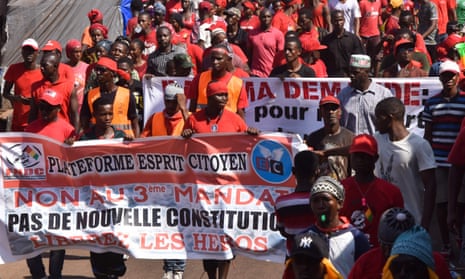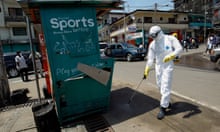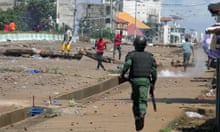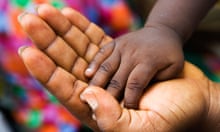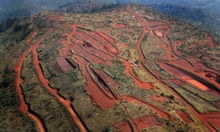On the morning of 14 November Abdourahmane Diallo set out on his motorcycle taxi along the pothole-laden roads of Conakry, the bustling capital of Guinea. By nightfall he was dead.
His family said the 16-year-old orphan was shot in the ear by police who were targeting opposition supporters in the Bomboly neighbourhood where the Diallos live. With blood pouring from the wound, Diallo was shuffled between government hospitals, family members said. One hospital said it had no capacity for new patients, another said it had no equipment to treat him. He died that evening.
“We do not blame God because he only takes back what is his but we do not forgive those who did this,” said Diallo’s uncle Boubacar Diallo, a petty goods merchant. “[We pray] that those who shot him are shot too.”
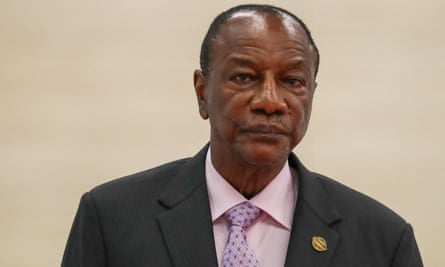
Guinea’s president, Alpha Condé, has been in power since the country’s first democratic elections in 2010, winning a second five-year term four years ago. Under the constitution, a president can serve two five-year terms. But ahead of next year’s election, government officials and allies of Condé have been dropping hints about amending the constitution or writing a new one to let him stand again.
As far back as January, the then Russian ambassador backed a change of the constitution to allow the “legendary” 81-year-old president to “reinvigorate” the country.
Then in May, the prime minister, Ibrahima Fofana, publicly admitted the constitution could be changed. The then justice minister resigned in opposition to the plan. In July, a leaked memo from June, signed by the foreign affairs minister, appeared to advise diplomatic missions on proposed constitutional amendments. Meanwhile, billboards endorsing a new constitution have erected across Conakry.
Finally, in September, Condé made his first public statement on the subject, though he was careful to avoid specifics. “I instruct the prime minister to initiate consultations to gather the opinions of others in an open exchange,” he said in a national TV broadcast.
For months hundreds of thousands of Guineans have taken to the streets for weekly protests against the prospect of Condé running for a third term. They chant the Susu phrase for “this will not happen”, the slogan of the protest movement, and burn car tyres. Many wear red T-shirts, armbands, hats and bandanas – the colour of the opposition coalition Front National Pour La Défense De La Constitution (FNDC).
Military and paramilitary forces have responded with live rounds and arrests. At least 20 civilians have been killed in the unrest to date, plus one gendarme.
Ten opposition leaders jailed in October for organising mass rallies were temporarily freed earlier this month. On 5 December their case was referred to the constitutional court, prompting cries of joy in the Conakry courtroom.
Opposition figures said security forces have been pouring into suburbs adjourning the areas of protest, which are usually opposition strongholds, and indiscriminately killing people.
Nadia Nahman, the chief of staff for opposition leader Cellou Dalein Diallo, said: “Alpha Condé is ready to walk on the bodies of Guineans to take a third term. Killing one’s compatriots to satisfy one’s disproportionate obsession with power is inhuman and despicable.”
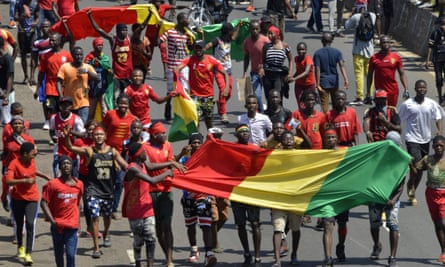
Across west Africa, leaders are tinkering with mandates and wrangling behind the scenes to stay in power for longer. Most recently, Alassane Ouattara, the Ivory Coast president, said he would run for a third term next year if historic rivals Laurent Gbagbo and Henri Konan Bédié were candidates too.
On 22 November, Nigeria’s president, Muhammadu Buhari, was forced to deny rumours he was preparing for a third term bid. “There are no circumstances – nor set of circumstances – under which President Buhari may seek to amend the constitution”, a presidential statement read. “President Buhari intends to serve his full second elected term in office, ending 2023 – and then there shall be a general election in which he will not be a candidate.”
Dr Christopher Fomunyoh, the regional director for central and west Africa at the National Democratic Institute, said: “After the enthusiastic embrace of democratic transitions in Africa in the early 1990s, some of the continent’s nascent democracies are under assault from recalcitrant autocrats who do believe they are the only individuals capable of running their countries.
“It is quite feasible that civil society organisations, labor unions and political parties opposed to the constitutional manoeuvring succeed in rolling back ongoing attempts in Guinea. We saw similar successes in blocking presidential term elongations in Senegal in 2012, with former president, Abdoulaye Wade, and, more recently, in the Democratic Republic of the Congo in 2016, with former president, Joseph Kabila.”
But resisting the will of the government could come at a bloody cost in Guinea, a former French colony that is rich in minerals but ranks among the poorest countries. “The struggle of the people of Guinea for democracy and the rule of law deserves all the sacrifices,” said Nahman. “Nothing will stop the people of Guinea from blocking the way of the promoters of a third mandate.”
For Abdourahmane Diallo’s uncle, his nephew’s death won’t discourage the family from participating in the protests. “We have to keep going,” Boubacar Diallo said. “[Condé] must leave power because what he is doing with his government is not at all good.”
